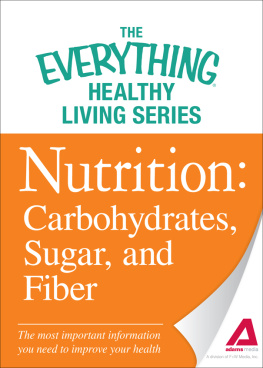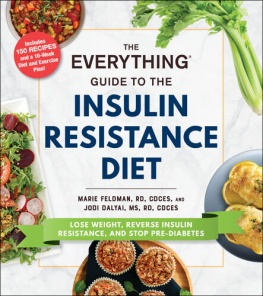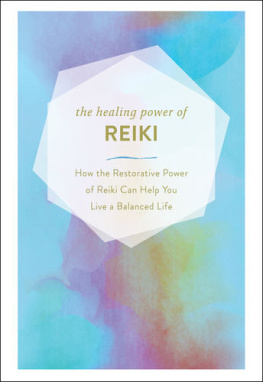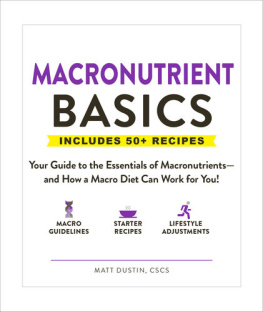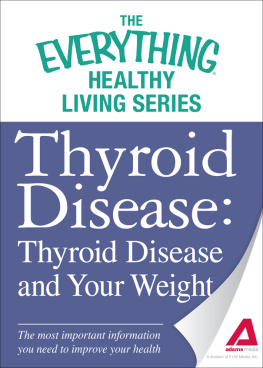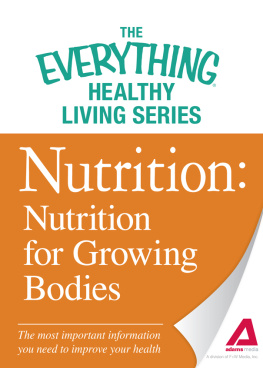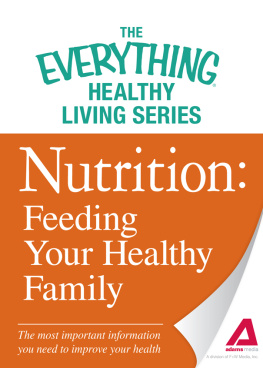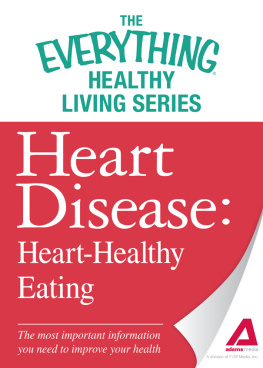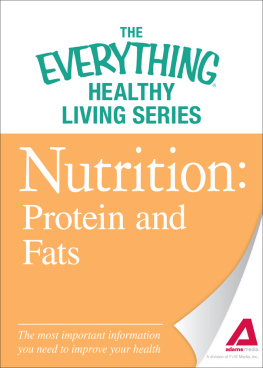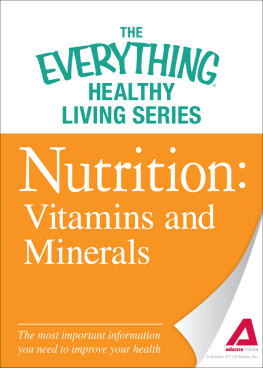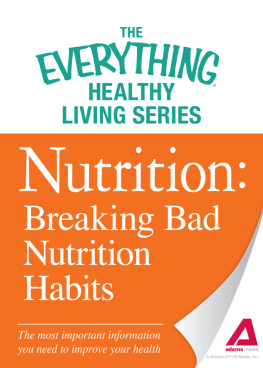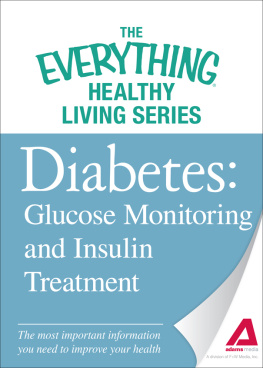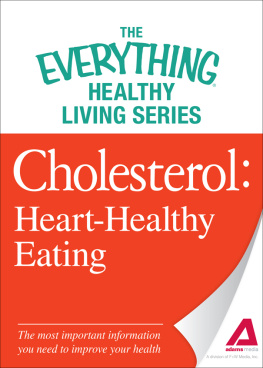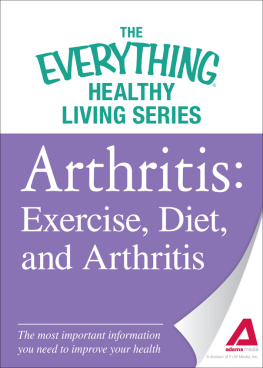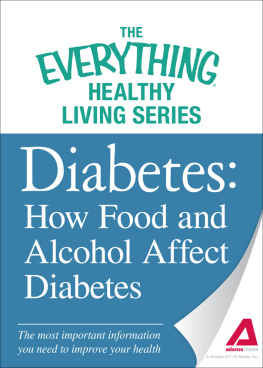Adams Media, an imprint of Simon & Schuster, Inc.
For more than 10 years, millions of readers have trusted the bestselling Everything series for expert advice and important information on health topics ranging from pregnancy and postpartum care to heart health, anxiety, and diabetes. Packed with the most recent, up-to-date data, Everything health guides help you get the right diagnosis, choose the best doctor, and find the treatment options that work for you.
The Everything Healthy Living Series books are concise guides, focusing on only the essential information you need. Whether youre looking for an overview of traditional and alternative migraine treatments, advice on starting a heart-healthy lifestyle, or suggestions for finding the right medical team, theres an Everything Healthy Living Book for you.
Nutrition
Food is everywhere. Every street has a restaurant, every event has a concession stand, and every commercial is dripping with cheese. Billboards, newspapers, and the Internet are constantly trying to sell you food. And you want to buy it. But is whats out there really something you need? Does it do your body any good? Is it making you healthy and strong? And what about the kids? How are they handling being inundated with constant food opportunities? Are they growing up healthy, lean, and fit? If they live in America, theres a good chance they arent.
Poor nutrition is a growing problem in the United States. Its not that we dont have enough to eat. Its that we have too much of the wrong stuff to eat. You probably already know you should lay off the fast food and pick up an apple instead of that doughnut. But have you ever wondered what healthier foods could really do for you?
Did you know that eating the right carbohydrates can give you ongoing energy? Did you know that bright fruits and vegetables can help protect you against cancer? Did you know that eating right at an early age can protect kids from food allergies?
Food is fuel. It can be delicious fuel, but it can also be the wrong fuel. Like putting diesel fuel in a gasoline engine, people often choose the wrong food. Without the proper fuel and regular intervals throughout the day, you sputter and stall and will likely need a tuneup, or worse, a complete overhaul. Getting the right fuel is not mysterious, difficult, expensive, or time-consuming. The Everything Healthy Living Series: Nutrition will show you exactly what, when, and how much you need to eat to get back on the road to good health.
Focusing on lifestyle changes instead of following a specific diet is the ticket to achieving optimal health, decreasing your risk of illness, increasing your energy level, improving your quality of life and well-being, and reducing your medications. In this series, youll find everything you need to know to get your family on the road to life-long good health.
If youd like to learn more about nutrition, check out The Everything Guide to Nutrition, available in print (978-1-4405-1030-4) and eBook (978-1-4405-1159-2) formats.
The Importance of Carbohydrates
Carbohydrates are necessary for achieving optimal health, and are found in four of the major food groups: whole grains, fruit, vegetables, and dairy products. These are your body and brains main source of fuel. Carbohydrates are also needed to maintain proper function of the central nervous system, muscles, and metabolism of fat and protein. Today, we find carbohydrates in many forms, making it difficult to distinguish which ones are truly beneficial for us. All carbohydrates break down into sugar in your blood, which causes your pancreas to release insulin that transports sugar to your cells for energy. However, the rate at which food breaks down into sugar determines if your energy levels are going to be stable or climb quickly then crash. Fiber found in carbohydrates slows digestion and helps keep energy levels and hunger in check.
Simple Carbohydrates
Simple carbohydrates are the sugars. They are grouped by the number of molecules from which they are made. Single sugars, or monosaccharides, have one molecule. They include glucose, fructose, and galactose. Sugars composed of two molecules are called disaccharides. They include lactose, maltose, sucrose, and honey.
Glucose
Glucose is made by plants during photosynthesis as energy for the plant. Glucose is found in plants, fruits, and honey. Also known as dextrose, it is the human bodys first source of energy. Most of the carbohydrates you eat are broken down into glucose by the body. Glucose is absorbed directly into the bloodstream, concentrating in the blood. This concentration is measured as your blood sugar level. You must eat 50 to 100 grams of carbohydrates each day to maintain good blood sugar levels.
Fructose and Galactose
Fructose is also found in honey, fruits, and plants. It is sweeter than glucose and table sugar. Galactose occurs in nature only as one of the two molecules that make up lactose.
Lactose
Also known as milk sugar, lactose is a disaccharide composed of one glucose and one galactose molecule. Found naturally in milk, it is the only animal-based carbohydrate. It is not commonly thought of as a sugar because it is not nearly as sweet as glucose.
Maltose
This disaccharide is composed of two glucose molecules. It is mainly seen in sprouting grains and is a vital component of beer. Brewers soak grain, usually barley, in water, until germination. The maltose is also extracted and used to make malt syrup, a common ingredient in artisan breads.
Refined Sugar: Sucrose
Sucrose is ordinary table sugar, derived from sugar cane and sugar beets. It is composed of one glucose and one fructose molecule. It occurs in small amounts in most fruits and is the most widely used sweetener in American homes. Sucrose provides quick energy, but it is stripped of its additional nutrients in the refining process, so it is not the ideal form of carbohydrate. The human body needs the entire natural package of a piece of fruit, or a tablespoon of honey, which, unlike table sugar, also includes fiber, water, vitamins, and minerals.
Honey
This disaccharide is also composed of one glucose and one fructose molecule. Honey is more concentrated than sucrose, which makes it twice as sweet. Consequently, less is needed when its used as a sweetener. The body breaks down and uses both sucrose and honey in the same way, but honey is a naturally occurring sweetener that needs no refinement. It contains other elements that are considered healthful, including vitamins, minerals, fiber, and antioxidants. Honey can be substituted for granulated sugar as a sweetener, but because it is twice as sweet, use half as much.
Complex Carbohydrates
Complex carbohydrates are found in plant foods that contain starch and fiber. They are known as polysaccharides, meaning more than two sugars. They come in chains of thousands of glucose molecules. In order to be absorbed, your body must break apart these molecule chains. It takes considerably more effort for your body to absorb polysaccharides than it does to absorb single or double sugars.

